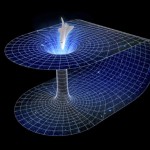By Dionysios Gakis
Nowadays, there is a lot of concern about these “black holes” in space. Many movies have as a theme people travelling in them or trying to escape from them. Some people believe that black holes are a danger for life on our planet. So what are really black holes and how dangerous are they?
In fact, black holes are the final stage of life of some very massive stars, they are dead stars. They have huge masses and as a result, a very strong gravitational field. They can “swallow” every single object which is near them, even a star. When something is swallowed by a black hole, it cannot escape from it and stays inside forever. They are so compact, due to gravity, that even light cannot escape from a black hole. As light cannot escape from a black hole, we do not see black holes (they are dark). That’s why we call them “black” holes.
So the definition which is given to black holes is regions of spacetime (according to Einstein’s relativity there are four dimensions in space: length, width, height and time) where gravitational forces are so strong that even electromagnetic radiations (light) or other particles cannot escape. These points in physics are called “singularity”. It is logically impossible but all the mass of black holes is broken apart to a single point, to what we understand as “nothing”. In these regions of spacetime, all our physic laws do not apply!
As we do not see black holes, are we sure that they really exist? First of all, our cosmological models expect them. In addition, there are ways in which we can deduce their existence. One way is the detection of gravitational waves. These waves are emitted, as their name implies, when the gravitational field somewhere in space changes. Black holes change the gravitation and emit gravitational waves.
Imagine an astronaut entering a black hole. What would happen? First of all, he would feel that he moves very fast. Then, the astronaut would become something like spaghetti (extremely thin) until he finally reaches the singularity point to become nothing. Journeys in black holes are not desirable! However, let’s suppose that the astronaut survived the journey; where would he go then?
According to some theoretical views, the mass would be transferred through a four-dimensional bridge into another hypothetical space, parallel to ours. This bridge is called Wormhole or Einstein-Rosen Bridge. In that space, the mass would be entered through a “white hole”, something like an opposite of a black hole. This bridge and the two holes can be compared to a throat and two mouths. However, we should mention that such astronauts’ trips are not totally possible due to contradictions with theoretical models.
Now, are we in danger because of black holes? Relax, no – or not yet. Our Sun will never become a black hole because it is a low-mass star. Even if it became, planets would continue to orbit the Sun. The death of humanity would come not from the existence of the black hole, but from the lack of the warmth and the beneficial rays of the Sun (photosynthesis, etc.). Nevertheless, we believe that a huge black hole is located in the center of our galaxy, the Milky Way, but the Sun is far away from it.
Sources:
- https://en.wikipedia.org/wiki/Black_hole
- Stephen Hawking, A Brief History of Time
- Kip Thorne, Black Holes and Time Warps






